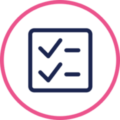Year 12 Maths
EP Maths has an extensive library of smart Year 10 lessons that are fully aligned to the curriculum and enable students to build their confidence in basic maths skills and grow their problem solving strategies.
Year 12 Maths Overview
While most senior secondary Maths students will be continuing on with prior learning from Year 11 in their chosen maths subject or subjects, for many Year 12 will be a step up in terms of complexity and difficulty. The Australian curriculum for senior secondary mathematics divides each subject into four units, each of which is designed to be taught in about a half a school year or over two semesters. This equates to approximately 50-60 hours in total, including teaching, classwork, assessments and examinations. The last two units, generally taught in Year 12, will be more challenging than the first two.
Some schools may teach these units in different ways, such as teaching all four units across one year, with more time allocated to each the following year. Checking in with specific schools will be the best way to determine how Year 12 Maths is taught locally. This is also true of the number, type and weighting of tasks in Year 12 school-based assessments, which in many states has been given over to principals and state authorities to determine, in order to allow for the interruptions of Covid and flooding in different areas of the country.
A guide to the four subjects available in Year 12 Maths
The Australian curriculum for Year 12 Maths consists of Essential Mathematics, General Mathematics, Mathematical Methods, and Specialist Mathematics. In some states, these subjects may be given different names, but they will essentially contain the same or similar content.
Over the course of four semesters in Year 11 and Year 12, students complete four units within each Maths subject. Choosing which subject is right for you depends on your future plans. Many post secondary career paths will require an element of Maths, and some will require more than one Maths subject to be completed to a high level. Most modes of employment and most modern lifestyles also involve mathematics to some degree.
In order to keep all avenues open for future endeavours, at least one Maths subject should be taken over your senior secondary years. This is particularly important in the current workplace environment, which is in constant flux due to the advance of technology.
What’s included in Year 12 Maths?
Here’s a run down of what is included in the different Year 12 Maths subjects, and the learning outcomes for Units 3 and 4 (Units 1 and 2 are generally covered in Year 11)
Year 12 Essential Mathematics
This subject focuses on the effective, efficient and critical use of mathematics in decision making. It uses real world content to provide mathematical knowledge, skills and understanding for solving problems in a range of community, employment, educational and personal settings. In this way, it helps prepare students for post-secondary training and workplaces and life in general.
Learning Outcomes for students in Essential Mathematics:
- To have an understanding of the concepts and techniques used in measurement, scales, plans, models, graphs, and data collection
- To have the ability to apply reasoning skills and to solve practical problems with measurement, scales, plans and models, graphs, and data collection
- To know how to communicate arguments and strategies when working through and solving mathematical and statistical problems through the use of appropriate mathematical or statistical language
- To interpret mathematical and statistical information and be able to ascertain the reasoning behind their solutions to problems.
- To be able to apply reasoning skills and solve practical problems, and having a good understanding of the concepts and techniques used in probability and relative frequencies, earth geometry, time zones, loans and compound interest
Year 12 General Mathematics
This subject focuses on the use of discrete maths techniques to solve contextual problems within the realm of decision making, financial modelling, network analysis, discrete growth and decay, route planning, and project planning. Students will also analyse and solve a range of geometrical problems using measurement, scaling navigation and triangulation. Statistical processes and systemic strategies will also be investigated, in order to make comparisons and associations, and to analyse time series.
Learning outcomes for students in General Mathematics:
- To understand the concepts and techniques in time series analysis; loans, investments and annuities; and networks and decision mathematics
- To apply reasoning skills and solving practical problems in time series analysis; loans, investments and annuities; and networks and decision mathematics
- To be able to implement the statistical investigation process in contexts requiring the analysis of time series data
- To successfully communicate arguments and strategies, when solving mathematical and statistical problems, using appropriate mathematical or statistical language
- To interpret mathematical and statistical information, and ascertain the reasonableness of solutions to problems and answers to statistical questions
- To choose technology appropriately and use it efficiently.
Year 12 Mathematical Methods
This subject requires students to develop skills and knowledge in the use of calculus and statistical analysis. The study of calculus gives a basis for understanding the physical world and its rates of change, and includes the use of functions and their derivatives and integrals, in order to model physical processes. Statistics in Mathematical Methods helps students learn to describe and analyse phenomena involving uncertainty and variation.
Learning Outcomes for students in Mathematical Methods:
- To show understanding of the concepts and techniques in calculus, probability and statistics
- To be able to solve problems in calculus, probability and statistics
- To apply reasoning skills in calculus, probability and statistics
- To interpret and evaluate mathematical and statistical information and ascertain the reasonableness of solutions to problems.
- To communicate arguments and strategies when solving problems.
Year 12 Specialist Mathematics
This subject is best paired with Mathematical Methods and it is often taken as an extension subject. It provides opportunities to create rigorous mathematical arguments and proofs, and to utilise mathematical models in extensive ways. With topics in functions and calculus that build on and deepen the ideas in Mathematical Methods, Specialist Mathematics will help students apply this knowledge to many areas. It also extends understanding and knowledge of probability and statistics, as well as the sub-topics of vectors, complex numbers and matrices.
Learning Outcomes for students in Specialist Mathematics:
- To apply reasoning skills and solving problems, and understanding the concepts and techniques in vectors, complex numbers, functions and graph sketching
- To be able to effectively communicate arguments and strategies when solving problems
- To be able to construct proofs of results
- To interpret mathematical information and ascertain the reasonableness of solutions to problems.
- To understand concepts techniques in applications of calculus and statistical inference
- To apply reasoning skills and solve problems in applications of calculus and statistical inferences.
What’s included in Year 12 Maths?
Here’s a run down of what is included in the different Year 12 Maths subjects, and the learning outcomes for Units 3 and 4 (Units 1 and 2 are generally covered in Year 11)
Year 12 Essential Mathematics
This subject focuses on the effective, efficient and critical use of mathematics in decision making. It uses real world content to provide mathematical knowledge, skills and understanding for solving problems in a range of community, employment, educational and personal settings. In this way, it helps prepare students for post-secondary training and workplaces and life in general.
Learning Outcomes for students in Essential Mathematics:
- To have an understanding of the concepts and techniques used in measurement, scales, plans, models, graphs, and data collection
- To have the ability to apply reasoning skills and to solve practical problems with measurement, scales, plans and models, graphs, and data collection
- To know how to communicate arguments and strategies when working through and solving mathematical and statistical problems through the use of appropriate mathematical or statistical language
- To interpret mathematical and statistical information and be able to ascertain the reasoning behind their solutions to problems.
- To be able to apply reasoning skills and solve practical problems, and having a good understanding of the concepts and techniques used in probability and relative frequencies, earth geometry, time zones, loans and compound interest
Scaling in Year 12 Maths
All subjects in Year 11 and 12 are scaled to account for the competition in the subject, rather than for the difficulty level. This gives the subject an Australian Tertiary Admission Rank or ATAR, which is the primary criterion for entry into undergraduate courses in Australian universities. This is done to even the playing field and it means that on the most part, students who take more challenging subjects will be scaled up. In terms of the four mathematical subjects in Year 11, they are ranked in terms of difficulty as follows: Specialist is the most difficult, followed by Mathematical methods, followed by General, then Essential Maths.
Help your students excel with fun and engaging teaching software

35,000+
Curriculum aligned lessons

10,000+
Learning videos

24/7
24/7 Personal Support

50,000+
Automatically Marked Questions
Why Use EP for Year 12 Maths?
EP is adjustable for every style of teaching. It’s built to enhance your ability as a teacher and offer your students both structured and flexible methods of learning. The platform allows you to adapt for individual strengths and weaknesses so every learner feels supported.
You can:
Create your own courses
Follow our pre built outlines
Engage your learner with our interest led functionality
Real time 24/7 tracking of student progress

Learn More On How Education Perfect Can Empower You:
Learning
An online platform made for teachers

